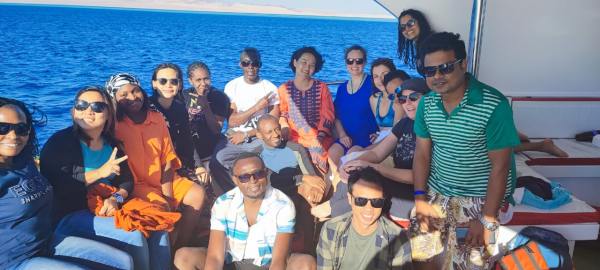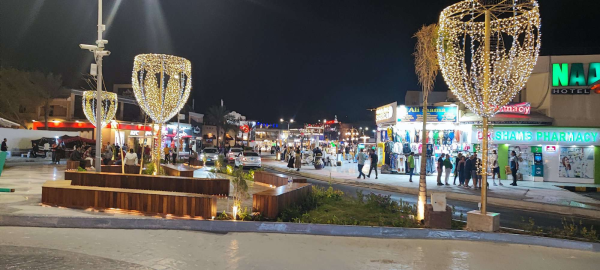Cape Town — Gather some popcorn or a bottle of wine, and let me take you on a ride covering one of the most anticipated climate events in the resort town of Sharm El-Sheikh, Egypt, which became the epicentre of the fight for climate justice.
It was a two weeks filled with knowledge, information, and adventures. The conference took place from the 6th to 20th of November, 2022.
It was a roller coaster ride of emotions.
My journey started two days before the kick-off of the biggest climate event. I set off from Cape Town International airport, had to fly to Johannesburg to catch my connecting flight to Nigeria, and then catch another flight to Egypt's Sharm el-Sheikh Airport.
Keep up with the latest headlines on WhatsApp | LinkedIn
In Johannesburg, I had a layover of about eight hours and in Lagos, Nigeria, another added six hours layover. I was over and done, physically exhausted and sick of being caged at different airports. If it wasn't for some fellow African travellers my sanity would have slipped out the door. In Nigeria, at every corner, if you ask for assistance, a "bless me" would follow. For those who're getting confused, it means leaving something, a gift, money, or a donation. I swear you could leave Nigeria broke before even getting to Egypt.
We arrived in Sharm El-Sheikh, or simply Sharm, in the middle of the night, and the airport was swamped with thousands of visitors who came for the COP27 meeting. By the time we left for our hotel, I was already tired and half asleep, and couldn't see much of the city.
The next day, all the journalists on the Climate Change Media Partnership Reporting Fellowships and trainers met to discuss how to cover the event and what to expect during the next two weeks. Trainers discussed topics such as loss and damage, finance, implementation, indigenous and gender inclusion, and young people's voices, among others. We discussed our reporting plans with our trainers and exchanged ideas. After the orientation, we headed to the venue for badge pick-up and our first look at the media centre.
And we were set for the most exciting two weeks of our lives. As one of the fellows said: "it was Disneyland of journalists" - but with less fun.
We got busy and swamped with our work. We ran around interviewing government delegates, activists, and environmentalists, capturing photos and videos, as well as attending many side events at various pavilions. We were taking part in meetings, panel events, and roundtable discussions. I got lost so many times, I even missed some events! I blame the poor and confusing signage around the venue. In short, it was borderline chaos during which I perfected the art of walking in circles. Especially when they said the Green Zone was closer to the Blue Zone, but alas that place was in another "city".
Everything was going well enough until it was time to eat.
Lord, we didn't expect the exorbitant prices of food at the conference. It was just insane. Not only was it expensive at the main conference but also at the local restaurants. If you had a tight budget, you would slowly die from hunger. We occasionally visited McDonald's or KFC where at least you could afford it. Maybe, we should have planned for this being an expensive tourist town.
By end of week one, we were literally marinated and fried, one by the sweltering sun of the desert and second, by the amount of work we had covered. However, we ended the week by taking a break and the fellowship organized a field trip to Ras Mohamed National Park, known for its coral reefs and beautiful marine ecosystem, where fellows had the chance to explore the water. My ancestors wouldn't allow me to get into the water in the middle of the Red Sea. So I stuck to what I know I know best - a photo shoot.

After that perfect weekend getaway at the Red Sea, we were again thrown into week two of "organised" chaos. Week 2 began with a day dedicated to water security and gender equality, followed by discussions on energy, biodiversity, and solutions. As a woman and an African - the people most affected by the climate crisis - these topics are especially important to me. Women raised their demands and proved that they're tired of taking the back seat in discussions that affect us, and need to take the lead.
Something interesting was that Sharm draws a lot of Russian, Ukrainian, and Italian holidaymakers. In fact, if you looked around, most buildings and some shops had Russian signs on them. These include dinosaur models and a fake Roman amphitheatre. It seemed like they own the town. Some locals would mention in passing that they don't like Russians because they were rude. I don't judge, but...
During the summit, we faced many difficulties.
How can we forget a sewage pipe burst near the exit of the Blue Zone? Many were stepping and jumping over the foul-smelling liquid waste flowing down one of the venue's main streets in order to catch a bus home. Thankfully, it was sorted out quickly and the situation did not recur.
And for those who were stuck in the media centre, like me, we cannot forget feeling like we are somewhere in the Antarctic. The cold air-conditioning really dealt with us. If you didn't bring a jacket, jersey, or shawl to protect yourself, then with these sub-Arctic air conditioning you were going to freeze to death.
There was also a stench of racism out in the atmosphere. Hidden but there. My colleagues and I laughed when we were asked, "Are you guys from Africa?" Hello, you are also from Africa or maybe we don't know better. We sometimes joked that this COP did not happen in Africa. I recall a time when we went to eat at a restaurant in Naama Bay and were asked to pay a "deposit" of like U.S.$20. We all knew that it was racial profiling as no other patrons of the other color paid such. Maybe, they thought we were the type to "dine and dash" but let's call a spade a spade - that was racial profiling.
I can't count how many times we got ripped off. The prices of everything will change, sometimes within 5 minutes of asking. Especially with cab drivers. These drivers had exorbitant fees and announced see-sawing prices even for the same distance. They would sometimes shut down the meters so that we didn't know the exact cost of a trip. Many delegates were ripped off, especially those who didn't know the concept of bargaining and negotiation like me. I'll gladly take the clown hat.
Did I mention that everyone smokes anywhere they want? It might be in the bus, or cab while carrying passengers. No one cared as long as they had a smoke. At the main COP27 conference centre, people would just pull out a cigarette, not caring if the smoke would affect others in any way. I wish they had a designated smoking zone, maybe we wouldn't have had this problem.
Talking about buses, the first week was a nightmare. It was hard to catch a bus as there were so many people and everyone will be in a rush to get to their respective hotels and rest. However, the buses not only ferried delegates but anyone who lived along the COP27 route, the main conference centre, or the hotels. I would honestly admit that taking the many shuttle buses was a real adventure, until you get off at the wrong stop. Then, it gets really interesting as just communicating with the locals was a struggle due to the fact that many didn't speak English.
It was shocking not to see that no women worked in Sharm. Even at the IL Mercato Hotel & Spa, where I was staying, the hotel staff was all male. But again, this is an Arabic country. They have different laws from other countries. So never mind! But it got me thinking, was Egypt the right country to host COP27?
One thing, I liked about Sharm is that it is a relatively safe city to tour and live in. We could walk in the middle of the night and have no problems whatsoever. The police will patrol the streets. And the city is packed with spaces brimming with culture and expression due to it representing so many nationalities. For example, we could eat at a Syrian restaurant, and buy souvenirs or jewellery at an Egyptian shop. This rich cultural integration gives visitors a homey feeling in a foreign country. With a community like Sharm, tourism is undoubtedly a key selling point.
However, I really disliked shop sellers who were constantly pushing for sales. A "no, thank you" will be clearly ignored.
After attending events at the conference, we would walk around, looking for places to chill, relax and replay the day's events. Most of us would end up in the beautifully-lit neighborhood of Naama Bay. The restaurants and bars would play loud music. Naama Bay's nightlife was really entrancing, we saw traditional dance performances, as well as the streets filled with friendly people, especially those trying to get you in their bars or restaurants. Vehicles are prohibited in and around shopping areas, restaurants, and streets in Naama Bay. It made walking really fun without the sounds of crazy drivers honking their horns.

We also visited some famous places like the Old Market where we saw beautiful monumental mosques and Old Egypt mountain.
It was an honour to cover COP27 and I valued my experience for a number of reasons. I spent most of my time at official side events and pavilion events learning and gaining more insights from a cross-section of experts, policymakers, advocates, government officials, and business people. As a result, I gained a good understanding of climate change terminology.
I also had the privilege of being in the same space with people like the Director-General of the World Trade Organization (WTO), Nigeria's Ngozi Okonjo-Iweala, U.S. President Joe Biden, African Union Commissioner for Agriculture, Rural Development, Blue Economy, and Sustainable Environment, H.E. Ambassador Josefa Sacko, U.S. Special Envoy for Climate John Kerry, Zambian President Hakainde Hichilema and youth activist Ugandan Vanessa Nakate and many world leaders and other high-level government officials. I had the privilege to speak and interview Hastings Chikoko, the Regional Director for Africa at C40 Cities Climate Leadership Group as well as Nigerian activist Celestine Akpobari. With these opportunities, I look forward to getting more involved with the climate emergency community.
There were so many interesting and amazing people I met, so many connections I established, and so many relationships I forged. It was fun to share ideas with each other, and have interesting conversations - sometimes even over a glass of wine and dinner.
As much as it was fun and hard work, much still has to be done to address the climate crisis and if we don't act right now, it will be a disaster for everyone, especially the people of my continent, Africa.





